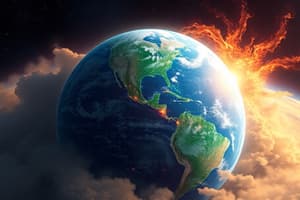Podcast
Questions and Answers
What does the word klima mean in Greek?
What does the word klima mean in Greek?
Inclination (angle)
Which of the following is NOT a key difference between the concepts of "climate" and "climatic change"?
Which of the following is NOT a key difference between the concepts of "climate" and "climatic change"?
In the 19th century, the dominant theory was a ______ of the Earth, rather than a gradual warming.
In the 19th century, the dominant theory was a ______ of the Earth, rather than a gradual warming.
slow cooling
What is the name of the theory that proposes that the Earth was initially formed from "fire"?
What is the name of the theory that proposes that the Earth was initially formed from "fire"?
Signup and view all the answers
Match the following scientists with their contributions to the understanding of climate change.
Match the following scientists with their contributions to the understanding of climate change.
Signup and view all the answers
The discovery of ice ages disproved the idea that the Earth was slowly cooling due to its formation from a molten state.
The discovery of ice ages disproved the idea that the Earth was slowly cooling due to its formation from a molten state.
Signup and view all the answers
What is the main purpose of a "Roche Moutonnée"?
What is the main purpose of a "Roche Moutonnée"?
Signup and view all the answers
The discovery of ice ages completely changed the way scientists thought about the Earth's climate system.
The discovery of ice ages completely changed the way scientists thought about the Earth's climate system.
Signup and view all the answers
The discovery of ice ages reinforced the notion that climate is primarily determined by the cooling of the Earth.
The discovery of ice ages reinforced the notion that climate is primarily determined by the cooling of the Earth.
Signup and view all the answers
What is the name of the third movement of the Earth, which was already recognized in antiquity?
What is the name of the third movement of the Earth, which was already recognized in antiquity?
Signup and view all the answers
Which of the following is a major factor in determining the Earth's climate?
Which of the following is a major factor in determining the Earth's climate?
Signup and view all the answers
The global warming that we are experiencing today is a completely new finding, not understood by scientists in the 1950s.
The global warming that we are experiencing today is a completely new finding, not understood by scientists in the 1950s.
Signup and view all the answers
What is the scientific term for the average global temperature increase due to a doubling of CO2 in the atmosphere?
What is the scientific term for the average global temperature increase due to a doubling of CO2 in the atmosphere?
Signup and view all the answers
What is the name of the first scientific assessment report for policymakers on climate change, prepared at the request of the US government in 1979?
What is the name of the first scientific assessment report for policymakers on climate change, prepared at the request of the US government in 1979?
Signup and view all the answers
The conclusion that CO2 has a significant effect on the Earth's climate remains true, even as our understanding of climate science has advanced.
The conclusion that CO2 has a significant effect on the Earth's climate remains true, even as our understanding of climate science has advanced.
Signup and view all the answers
Global warming was not a new finding in the 1950s, as it was already being recognized in the 19th century.
Global warming was not a new finding in the 1950s, as it was already being recognized in the 19th century.
Signup and view all the answers
What is the name of the period in Earth's history that lasted from 540 million years ago to the present day?
What is the name of the period in Earth's history that lasted from 540 million years ago to the present day?
Signup and view all the answers
The "Snowball Earth" periods occurred before the Phanerozoic era.
The "Snowball Earth" periods occurred before the Phanerozoic era.
Signup and view all the answers
The Great Oxidation Event, which increased oxygen levels on Earth, occurred simultaneously with the first "Snowball Earth" period.
The Great Oxidation Event, which increased oxygen levels on Earth, occurred simultaneously with the first "Snowball Earth" period.
Signup and view all the answers
What is the name of the most recent glacial maximum, which occurred around 21,000 years ago?
What is the name of the most recent glacial maximum, which occurred around 21,000 years ago?
Signup and view all the answers
What is the name of the landmass that existed during the last glacial maximum, connecting North America and Asia?
What is the name of the landmass that existed during the last glacial maximum, connecting North America and Asia?
Signup and view all the answers
What is the name of the submerged landmass that existed in the North Sea area during the last glacial maximum?
What is the name of the submerged landmass that existed in the North Sea area during the last glacial maximum?
Signup and view all the answers
The last glacial maximum was a time when the Earth was about 4 to 6 degrees Celsius colder than it is today.
The last glacial maximum was a time when the Earth was about 4 to 6 degrees Celsius colder than it is today.
Signup and view all the answers
What is the name of the massive ice sheet covering Antarctica today?
What is the name of the massive ice sheet covering Antarctica today?
Signup and view all the answers
The grounding line refers to the boundary between grounded and floating ice in Antarctica's ice sheet.
The grounding line refers to the boundary between grounded and floating ice in Antarctica's ice sheet.
Signup and view all the answers
The mass balance of the Antarctic ice sheet is solely determined by the amount of snowfall.
The mass balance of the Antarctic ice sheet is solely determined by the amount of snowfall.
Signup and view all the answers
The Antarctic ice sheet is the largest reservoir of freshwater on Earth.
The Antarctic ice sheet is the largest reservoir of freshwater on Earth.
Signup and view all the answers
The dynamics of an ice sheet are primarily controlled by large-scale topographic features, such as mountains.
The dynamics of an ice sheet are primarily controlled by large-scale topographic features, such as mountains.
Signup and view all the answers
The Quaternary Ice Age is characterized by periods of slow, gradual changes in climate.
The Quaternary Ice Age is characterized by periods of slow, gradual changes in climate.
Signup and view all the answers
What is the name of the event that involves the abrupt discharges of icebergs from ice sheets, causing a decrease in sea-level and a sudden influx of cold, fresh water into North Atlantic?
What is the name of the event that involves the abrupt discharges of icebergs from ice sheets, causing a decrease in sea-level and a sudden influx of cold, fresh water into North Atlantic?
Signup and view all the answers
What is the name of the events characterized by abrupt temperature changes in the North Atlantic, driven by oscillations in oceanic circulation?
What is the name of the events characterized by abrupt temperature changes in the North Atlantic, driven by oscillations in oceanic circulation?
Signup and view all the answers
What is the name of the scientist who first calculated the climatic effect of CO2?
What is the name of the scientist who first calculated the climatic effect of CO2?
Signup and view all the answers
The "runaway greenhouse" effect is a process that could potentially occur if the Earth's atmosphere is too warm to effectively dissipate heat.
The "runaway greenhouse" effect is a process that could potentially occur if the Earth's atmosphere is too warm to effectively dissipate heat.
Signup and view all the answers
What is the name of the primary mechanism that stabilizes the Earth's climate over long timescales?
What is the name of the primary mechanism that stabilizes the Earth's climate over long timescales?
Signup and view all the answers
The increase in solar radiation is a significant factor in the Earth's long-term warming trend.
The increase in solar radiation is a significant factor in the Earth's long-term warming trend.
Signup and view all the answers
Study Notes
CentraleSupelec 2024 - Sciences du Climat
- Course taught by D. Paillard
- Contact: [email protected]
Programme
- CM 1: Earth's Climate Change
- TD 1: (Tutorial Session)
- CM 2: Basic Mechanisms
- TD 2: (Tutorial Session)
- CM 3: Climate Modelling
- TD 3: (Tutorial Session)
- CM 4: Simulations of Past and Future Climates
- CM 5: Vegetation and Land Use
- Exam: Multiple Choice Questions (QCM)
Climate: A Geographical Concept
- Etymology: Greek "klima" meaning inclination (sun's height).
- Historically used synonymously with latitude.
- Defined environmental conditions for life (habitable zone).
- Ancient Greeks (Aristotle) defined habitable zone as between tropics and polar circles.
- Latitude a primary determinant of climate.
- Modern climate classification emphasizes various factors including temperature and precipitation.
Earth's Climate Change - Outline
- Notion of climate and climate change.
- History of Earth's Climates.
- The Last Ice Age and Climatic Surprises.
Discovery of Ice Ages
- Ice ages changed perception of climate change - no longer just cooling.
- Past temperatures not directly deduced from fossils, other methods necessary.
- Evidence from landscapes (e.g., striations, roche moutonnees, moraines) crucial for identifying ice ages.
- Boulders transported by glaciers provide extensive evidence.
Two Physical Theories
- CO2: Greenhouse gases importance identified by J. Fourier, 1824.
- Tyndall measured IR absorption by atmospheric gases.
- Arrhenius (1896) computed climate effect of CO2.
- Astronomy: Milankovitch cycles (variations in Earth's orbit) key to understanding climate variability, also established by ancient astronomers.
Climate Sensitivity
- Arrhenius (1896) first to compute climate effect of CO2 - 5°C.
- Callendar (1938) observed warming as being consistent with CO2 increase.
- After 1950s, advances in atmospheric modelling and computing allowed more accurate calculations.
Climate Change: A Geological Concept
- 19th century geologists and physicists strongly disagreed about Earth's age (Buffon, Kelvin) which had implications for understanding climate change.
- The idea that Earth's global climate changes through time is a geological concept.
- Initial ideas of Earth's climate change assumed Earth was gradually cooling from an initial molten state..
Confirmation by Observations
- Global warming predicted in 19th & 20th centuries.
- 21st century observations strongly confirm predictions and trends..
- Greater heat capacity in oceans compared to land (affecting distribution).
A Brief History of Climate
- Paleo/Meso/Cenozoic periods: indirect information (CO2 proxies) to understand climate
- Cenozoic: isotopic composition of foraminifera - quantitative proxy for ocean temperatures and ice volume.
- Quaternary: oxygen isotopes from ice cores - quantitative proxy for atmospheric temperatures.
Additional Concepts
- Eocene: high temperatures (+8 to +12°C), tropical forests in polar regions existed, high CO2 levels.
- Carboniferous: "cold" period.
- Last Glacial Maximum: about 21,000 years ago. Significant temperature drop (4 -6°C), lowered sea level exposing land bridges (Doggerland) or islands (Sunda).
- Dansgaard-Oeschger events: rapid fluctuations in temperature during ice ages (~10-16°C change in a few decades or centuries).
- Heinrich events: extensive iceberg discharge events in the North Atlantic (correlating with climate fluctuations.
- The Greenhouse Effect: Atmosphere absorbs and traps IR radiation, keeping Earth warmer than it would be without an atmosphere.
Climate Changes and Mechanisms (More in Depth)
- Solar variability: variations in the Sun's energy output (e.g., solar cycles) affect Earth's climate.
- Orbital variations: changes in Earth's orbit around the Sun (Milankovitch cycles) affect the distribution of solar radiation, influencing climate.
- Ocean currents: ocean currents redistribute heat around the globe, which is vital for regional climates. Disruptions of the currents can have significant effects on global climate.
- Greenhouse gas concentrations: concentrations of greenhouse gases in the atmosphere affect the Earth's radiative balance and influence temperatures.
- Carbon cycles: complex system of carbon fluxes between different reservoirs (atmosphere, ocean, biosphere, land) influencing climate.
Other Concepts
- Climate sensitivity: how much Earth's temperature changes for a change in forcing.
- Ice ages: significant periods of glacial growth and retreat.
Studying That Suits You
Use AI to generate personalized quizzes and flashcards to suit your learning preferences.
Related Documents
Description
This quiz covers key concepts from the CentraleSupelec 2024 Climate Science course. Explore topics such as Earth's climate change, basic climate mechanisms, and the impact of vegetation and land use on climate models. Prepare for your exams with a focus on multiple choice questions.




